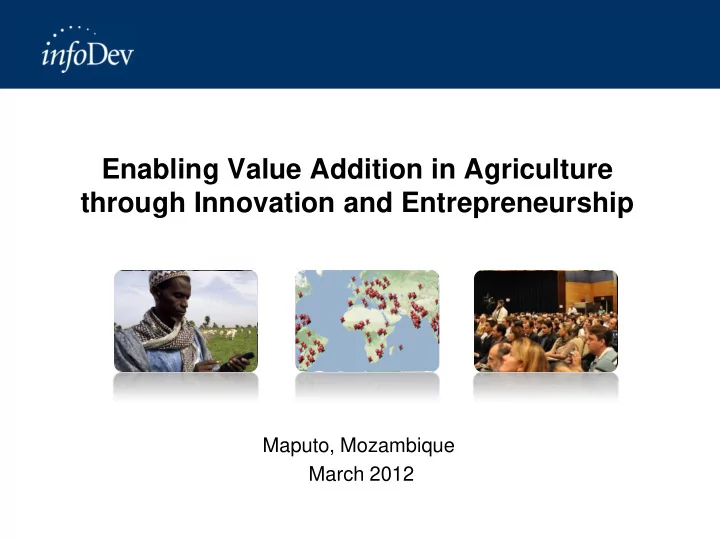

Enabling Value Addition in Agriculture through Innovation and Entrepreneurship Maputo, Mozambique March 2012
About infoDev A donor funded program in the Financial and Private Sector Development Department of the World Bank Group Mission: To promote the growth of innovative enterprises to enhance sustainable inclusive growth, competitiveness and job creation • Diffusion of new • Commercialize new • Research and Outcome s Products Goals products and services technologies Knowledge -sharing • Sustainable job • Create and grow • Capacity building creation competitive and • Policy toolkits • Increase in economic sustainable enterprises • Stakeholder • Promote an enabling competitiveness and convenorship and global sustainable environment for networks development innovation • Project preparation and implementation
Our Focus Incubating Enterprises in Three Sectors: Information and Communication Technologies, particularly mobile Climate Technologies Agricultural Value Addition Supported by Cross-Sectoral Services: Global Forum on Access to Finance Networks: Innovation and and Markets (A2F & Incubation Training: Bridging the gap A2M): Bridging the Technology Enhancing the between SMEs Entrepreneurship: gap between SMEs capacity of and funding and funding sources, developing country sources, India, 2006 + 2008 customers and incubation customers and Helsinki, May 2011 partners managers partners South Africa, 2013
Harnessing a global network of incubators and SMEs Focus on enterprises that use innovation to deliver competitive solutions to increase market reach Snapshot of Results 300+ incubators globally 100% locally owned and operated 6 Regional Networks 80+ developing countries 20,000+ SMEs assisted 220,000+ Jobs created 90% success rate of incubators 75% survival rate of Global Communities Regional Networks: of Practice: incubated SMEs 3 years after Asia, Africa, ECA, Youth, Women, ICT graduating Middle East / North High Growth, Agri- Africa, Latin America / ~1:1 leverage with local business Caribbean partners
Enabling Agribusiness Innovation and Entrepreneurship Global Good Practice Assessment and Training Feasibility Assessments in Agribusiness and Business Models: Incubation: Innovative Agribusiness Innovation approaches to promoting Source Books: and Entrepreneurship value-addition in the Resource for promoting Centers in Senegal, agricultural sector ICT and Innovation in Mozambique, Ethiopia, agriculture Tanzania Global Community of Practice on Agribusiness Innovation and Entrepreneurship
Enabling Agribusiness Innovation and Entrepreneurship in Mozambique
Starting Point • Opportunity: – Mozambique has a comparative advantage in production in some agricultural sectors (e.g. Cashew, Banana) • Challenge: – In many of these sectors: • Farmers experience tremendous post-harvest losses • The products are exported as unprocessed raw materials • Processed agricultural products are imported • Agricultural outputs are not consistently of good quality How can we leverage Mozambique’s comparative advantage to enable the start-up and growth of innovative SMEs that • increase the incomes of farmers? • create new jobs? • provide Mozambican consumers with quality products and affordable prices? Particular focus on value addition
Enabling Entrepreneurs Resources Required by Entrepreneurs Innovative entrepreneurs who wish to start and accelerate an agribusiness require: 1. Access to market information, skills, finance, quality inputs and technologies 2. Enabling business regulations 3. Adequate infrastructure (roads, electricity, telecommunications) 4. Favorable market conditions Stakeholders Who Affect Access to Resources The extent to which these resources are provided depends on • Policymakers and regulators • Academic institutions • Financiers • Farmers and industry
Exploring Options through Stakeholder Engagement Feb-June 2012 What are the agricultural sub-sectors, products and/or value chain segments that offer high growth opportunities for Mozambique? Who are the stakeholders in enabling enterprise start- up and growth in these sectors? Workshops Interviews What barriers do innovative entrepreneurs face to Surveys starting and growing their businesses in these sub- Literature Review sectors? What service offerings are already being provided? What are their unmet needs? What is a service offering that could be designed to enable the start-up and growth of agribusiness SMEs? Global good practice What would be the business model for provision of these services. Who are the partners who could bring Agri CoP it to fruition? Where should the service provision be hosted?
infoDev’s Role FACILITATION AND PARTNERSHIP • Listen to Mozambican stakeholders to understand the opportunities, challenges and needs • Introduce examples, good practices and lessons from across the continent and beyond • Co-design a model and identify implementation partners • Co-present the model for implementation funding • Guide implementation of a locally owned and operated service offering Contact: sgiddings@worldbank.org
Recommend
More recommend